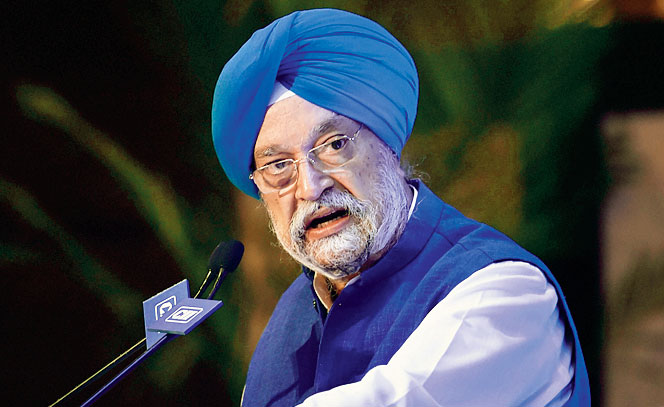The Centre has no plans to impose a cap on plane ticket prices to halt predatory pricing, which airlines resort to whenever there is a natural calamity, civil disturbance or a long string of holidays.
Hardeep Puri, minister of state (independent charge) for civil aviation, held his ground in the face of a clamour from Lok Sabha members for the government to put a lid on airline fares, which rocket to stratospheric levels whenever there is a crisis.
Airlines have tended to blame such price surges on the system of dynamic pricing that the industry embraced a few years ago.
The issue of predatory pricing by airlines was raised by Pinaki Mishra, Biju Janata Dal member from Puri, who wanted to know whether the government would consider capping fares during crises. He cited two recent instances when airfares had gone through the roof.
During the Jat agitation in Haryana, Mishra said, airfares on the Delhi-Chandigarh route had crossed Rs 90,000 a ticket. Again, when Cyclone Fani hit Odisha last month, the fares for flights from Delhi to Bhubaneswar had topped Rs 60,000, he added.
In his reply, Puri said there was little scope for government intervention in airline ticket pricing because of the dynamic pricing mechanism and the fact that airlines were largely privately owned.
“Any attempt to impose a cap on prices could actually prove to be counter-productive,” the minister argued.
The dynamic pricing system provides for different price buckets depending on when the passenger books his ticket.
Usually, fares on medium-haul flights can be as low as Rs 5,000 if the tickets are bought at least three weeks in advance. They tend to rise nearer to the date of the flight but aren’t unusually high most of the time.
Puri claimed that if the government imposed a price cap, the fares in the lower buckets would disappear and would head upward towards the capped price — a characterisation of price behaviour that economists may challenge.
This is not the first time that the Modi government has shied away from a popular demand to cap airline ticket prices.
In January last year, a parliamentary standing committee on transport, tourism and culture had submitted a report in which it suggested that the government should set limits for airline ticket prices and ensure fair cancellation charges.
The committee also went on to say that the dynamic fare pricing mechanism – a globally accepted practice – may not be suitable for India.
“The Committee notes that around festivals and for bookings made closer to the date of travel, some airlines are charging more than 10 times of the advance booking fare. The Committee observes that this is arbitrary. A deregulatory environment does not mean unlimited freedom of exploitation,” the report said.
“Economic viability cannot be the only criteria for decision-making. The Ministry of Civil Aviation, though aware of the rampant exploitation, is not showing any proactive role in regulating the air fares. The Committee, therefore, recommends to the ministry of civil aviation to consider fixing an upper limit of the air tickets for every sector.”
At that time too, then civil aviation minister Jayant Sinha defended the Modi government’s hands-off policy on the issue and argued that less than 1 per cent of the air fares go above the average – an argument that Puri also tried to advance amid uproar in the House.
The debate was quickly cut short by the deputy Speaker even as opposition members from the Congress, the Trinamul Congress, and DMK accused the minister of trying to justify predatory pricing by private airlines.










